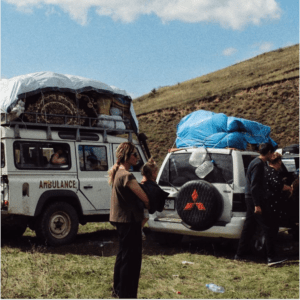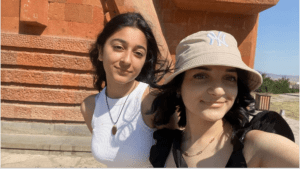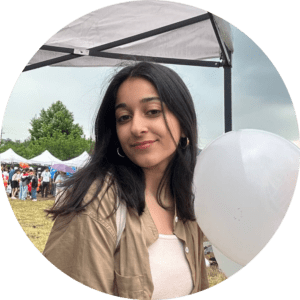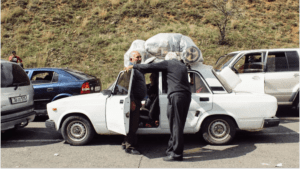18-year-old Lana Tonyan shares the trauma of fleeing her homeland to a new life in Armenia

Forced displacement of more than 120,000 Armenians from Artsakh (Nagorno-Karabakh) on 27 September 2023.
November 29, 2024
My experience as a teenage refugee from Artsakh
On 19 September 2023, the beginning of war in Nagorno-Karabakh shook the whole Armenian nation. Armenians living in Artsakh (the official name of the unrecognised Republic of Artsakh) were forced to leave their homes, knowing they would not have the opportunity to return. I was one of them.
The exodus of Armenians began at the end of September. We were forced to leave, but due to the blockade of the region since December 2022, we had no fuel and couldn’t use our cars. No one could have imagined that the situation would become even worse.
On 25 September, a huge explosion occurred at a fuel depot. At least 170 people died, and many others were injured. That day’s events marked the final devastation for us.
Meanwhile, endless lines of cars stretched from the centre of Stepanakert to the road leading to Armenia. It took my family three days to reach the Armenian border, a journey that would normally take only two to three hours.

Lana (left) posing with a friend in front of the Armenian 'We Are Our Mountains' monument in Artsakh before the forced displacement in September 2023.
The emotions I experienced when we reached the Armenian border were indescribable. I felt like the loneliest person in the world, and all I could think was, why? Yet, people were waiting for us on the other side of the border. Young Armenians were helping people voluntarily, which was the most heartwarming thing.
Recently, one of my professors at the university in Yerevan asked us: are you a result person, or a journey person? War has made me become a ‘journey person’.
The displacement made me realise things I could never imagine. It was hard to recognise that the place you admired the most, your home, was considered an important geopolitical zone or, even worse, a dangerous war zone. I never felt as if I was living in a dangerous place, because, in fact, those were the most peaceful years of my life.
Post-war life changed the person I am. It makes you question your whole existence; you appear to be in an identity crisis, which is even worse when everyone around you is in trauma. But I don’t want to identify myself with that devastating experience. Rather, when I think about Artsakh, I remember the warm and happy years that I spent there.
Imagine you are a 16-year-old girl, who has typical teenage problems with studying, relationships or self-worth and your reality is that you are deprived of basic human rights, such as limited access to food, and your brother is fighting at the front.
Do these teenage problems matter now? Do you even have time to care for them? The answer is, if it is the only way to run from reality or trick yourself, then maybe yes.
After relocating to Armenia, I met many new people and had to tell them my story, which sometimes made me uncomfortable, even though I knew most people would welcome me. The empathy and interest they showed towards me was highly appreciated, and the questions they asked were truly heartwarming. Yet something was different – I didn’t feel understood.
My people lost everything after the displacement and now struggle with having their basic needs met, which is exactly what made me feel so alienated.
When I tell someone that I am from Artsakh, I would like to hear “Oh, I’ve been there, It’s such a lovely place”, or ‘’I’ve tried ‘jengyalov hats’ [an herb-stuffed flatbread] there, and it was so tasty!” I don’t want people to think that if I’m from Artsakh, I am weak or vulnerable.
I don’t want people to remember my homeland for its tragedies. Yes, there has been an immense loss and sorrow, but in my memories, it’s not only about sadness, but about beauty, strength and resilience.
I think it is so important to share this part with future generations, because they need to know what it was really like, they have to know about real stories. By preserving these stories we protect the legacy that this place represents. It’s our responsibility to honor it and show the world its true value.





